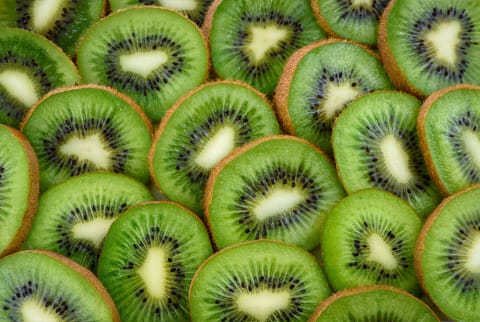
Image by PhotoMIX Company / Pexels
January 28, 2023
Calling anyone with regular constipation: There’s cause to expand your grocery list next time you’re walking down the fruit aisle. A new study from the The American Journal of Gastroenterology (AJG) found that consuming two kiwifruits a day can increase the frequency of complete spontaneous bowel movements (CSBM) and decrease gastrointestinal pain for people with functional constipation or constipation-predominant irritable bowel syndrome (IBS-C).
Advertisement
This ad is displayed using third party content and we do not control its accessibility features.
How eating kiwifruits helps with constipation.
The study compared the benefits between consuming six grams of dietary fiber via two skinless kiwifruits and taking a 7.5-gram dose of psyllium (a supplement commonly used for constipation).
Participants included healthy controls and constipated individuals that had either functional constipation, IBS-C, or a combination of both. Each participant took one of the two interventions for four weeks, was given a four-week clear-out period, and then assigned the other intervention for four weeks.
Researchers found that consuming two green kiwifruits a day resulted in a clinically relevant increase of at least 1.5 complete spontaneous bowel movements for participants with constipation. When taking psyllium, only IBS-C participants saw a significant increase of 1.25 CSBM.
Gastrointestinal symptoms also improved significantly for all groups consuming kiwifruits. However, only IBS-C participants saw a significant improvement in GI symptoms when taking psyllium.
Limitations of the research included participants’ self-reporting, adherence to the intervention, food consumed, and details of bowel movements. The study was also relatively small, involving a total of 184 people.
That said, the study builds on past research around kiwifruits’ benefits for constipation. A 2022 review from the Advances of Nutrition found that green kiwifruit, gold kiwifruit, and kiwifruit supplements all positively affect upper GI health1.
A 2018 review from the European Journal of Nutrition2 credited kiwifruit’s gut health benefits to the water retention capabilities of their dietary fiber and the natural presence of the proteolytic enzyme actinidin, which contributes to easier protein digestion in the small intestine and stomach.
Researchers of the AJG publication acknowledged the work this study built upon: “Taken in conjunction with previous clinical trials of green kiwifruit and the emerging physiological data from functional studies, consumption of two green kiwifruits can be safely recommended as an effective treatment for constipation in those with functional GI disorders that will also provide improvements in symptoms of GI comfort.”
What to know about constipation and fiber.
An increase in proven methods for reducing constipation can have a massive impact. According to a 2017 review published by the American Journal of Nursing, IBS can cause abdominal discomfort, bloating, and infrequent (three or fewer a week) or difficult bowel movements.
According to a 2021 JAMA review, IBS affects an estimated 7% to 16%3 of the U.S. population and is most common in women and young people. ISB-C doesn’t require further testing unless symptoms don’t resolve with treatment. In contrast, functional constipation doesn’t always cause abdominal pain, but still brings difficult and infrequent bowel movements.
Fiber is clearly a key player in managing IBS and functional constipation. It can also help with lowering cholesterol and your risk of diseases, like colon cancer and diabetes, according to a Metabolism review.
So, how much fiber should you be having, exactly?
The National Academies4 recommend that women have at least 25 to 28 grams of fiber per day and men have at least 38 grams daily. Yet, a 2017 American Journal of Lifestyle Medicine5 scientific review found that the average American only eats about 16 grams of fiber a day.
Fruits, vegetables, whole grains, beans, nuts, and seeds are all good sources of fiber. To ensure you’re meeting your daily recommended intake goal, consider taking a quality fiber supplement as well, perhaps one with kiwifruit! (You can check out mindbodygreen’s roundup of the best fiber supplements here.)
Advertisement
This ad is displayed using third party content and we do not control its accessibility features.
The takeaway.
Consider picking up some kiwifruits if you have IBS-C or functional constipation. Having them regularly may deliver significant benefits for reducing constipation.
As you adjust your diet, check in with yourself to determine if they’re working well for you. If kiwifruits aren’t your thing, try another high-fiber food or a premium fiber supplement instead.
Advertisement
This ad is displayed using third party content and we do not control its accessibility features.

Sarah Fielding
Sarah Fielding is a freelance writer based in New York City. Covering a range of topics with a focus on mental health, sex, and relationships, her work has appeared at Healthline, The Huffington Post, Men’s Health, INSIDER, Bustle, NYLON, and more. Fielding received her bachelor’s in international fashion and business management from FIT, and also spent time living in Italy and Australia, writing as she traveled. She’s the co-founder of Empire Coven, a space for highlighting trailblazing women across New York.






